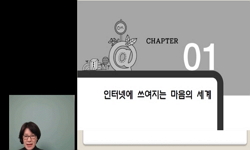This study investigates how paper-based textbooks were used in online English language teaching in Japanese universities during the COVID-19 pandemic, applying a posthumanist approach. Two online surveys were conducted with 126 students to examine the...
http://chineseinput.net/에서 pinyin(병음)방식으로 중국어를 변환할 수 있습니다.
변환된 중국어를 복사하여 사용하시면 됩니다.
- 中文 을 입력하시려면 zhongwen을 입력하시고 space를누르시면됩니다.
- 北京 을 입력하시려면 beijing을 입력하시고 space를 누르시면 됩니다.


Posthumanist Approach to the Role of Textbooks that Underpins Student Engagement in English Language Learning under Covid-19: A Case from Japanese Universities
한글로보기https://www.riss.kr/link?id=A108530176
-
저자
Hiroyuki Ida (Josai University) ; Yaoko Matsuoka (University of the People)

- 발행기관
- 학술지명
- 권호사항
-
발행연도
2023
-
작성언어
English
- 주제어
-
등재정보
KCI등재,SCOPUS,ESCI
-
자료형태
학술저널
-
수록면
1-13(13쪽)
- DOI식별코드
- 제공처
-
0
상세조회 -
0
다운로드
부가정보
다국어 초록 (Multilingual Abstract)
This study investigates how paper-based textbooks were used in online English language teaching in Japanese universities during the COVID-19 pandemic, applying a posthumanist approach. Two online surveys were conducted with 126 students to examine their perception of the role and the use of paper textbooks in online classes in 2020 and 2021. Results of the obtained data and free description showed that students effectively engaged in online learning in both home space and classroom, and paper-based textbooks assisted them in developing a sense of community by sharing the same contents remotely.
These results suggest that paper-based textbooks worked effectively in the pandemic-driven online learning environment. The findings are also underpinned by Japan's education policy of providing free textbooks from elementary to secondary education. At the same time, it appeared that students gradually got accustomed to online learning and began seeking new materials that would give them more options and fit online teaching. Future research would include uncovering the relationship between teachers' beliefs and students' actual sense-making processes.
동일학술지(권/호) 다른 논문
-
- 아시아테플
- Atsushi Watanabe
- 2023
- KCI등재,SCOPUS,ESCI
-
Promises of English and English Language Learners in Rural Bangladesh
- 아시아테플
- M. Obaidul Hamid
- 2023
- KCI등재,SCOPUS,ESCI
-
- 아시아테플
- 박부남
- 2023
- KCI등재,SCOPUS,ESCI
-
The Cognitive Process with Intensive and Rapid Vocabulary Acquisition Tasks Using Multimedia Glosses
- 아시아테플
- Fu Lee Wang
- 2023
- KCI등재,SCOPUS,ESCI




 KCI
KCI eArticle
eArticle




